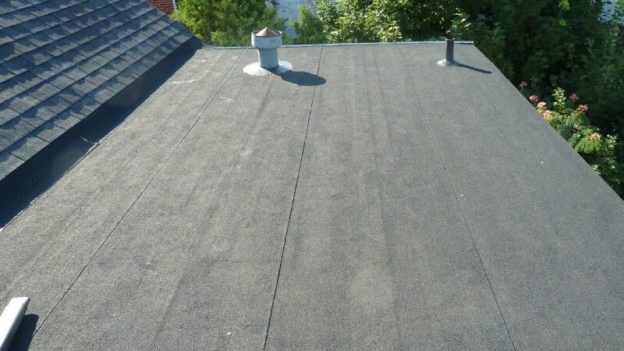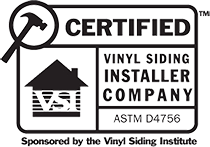An SBS roof is one constructed from specific materials to help make it waterproof. If you’d like a little more detail on exactly what SBS roof is, and what the benefits are – then this article is for you.
We’re going to dive deeper into the subject so you know exactly what does SBS roofing stand for and what it is, also why it’s a good option for your roof.
SBS specifically stands for Styrene-Butadiene-Styrene, but this might not mean much to you unless you’ve got a strong background in chemistry. Another way to look at SBS if you don’t really know what Styrene-Butadiene-Styrene means, is that it’s a family of synthetic rubber.
SBS is widely used in the roofing industry for waterproofing roofs because of its flexibility and elastic properties. That means it can adapt it’s shape in various weather conditions while still keeping the integrity of the roof and also making sure everything underneath the roof stays dry.
SBS therefore isn’t just used in roofing, and is relied upon in a number of other applications that need this level of flexibility and durability – like coatings, sealants and paving.
What are the advantages of an SBS roof?
There are a number of advantages to using this type of chemical sealant in a number of different applications, including roofing – let’s have a look at them.
1. SBS is compatible with a huge number of different applications that aren’t simply limited to roofing (although that’s one of its most popular uses). It can be used to waterproof all sorts of surfaces, including tons of different types of roofs – but also car decks, bridges and more.
2. It’s also an extremely resistant and resilient chemical, and will stand up against extreme heat and cold without giving way. That means you can keep a wide range of surfaces watertight no matter what the weather. It’s also resistant to frost, freeze-thawing, heavy rain and heavy snow.
3. SBS roofing is also an extremely long-lasting solution. It retains integrity and water-proofing decades after being applied to a surface.
4. Another reason more and more professionals are starting to use SBS for roofing and more is that it’s extremely flexible while managing to maintain the integrity of a sealed roof. One of the main issues with large roof constructions is that many of them are required to move slightly under different environmental forces.
5. Buildings (and therefore roofs) can expand and contract during hot and cold weather conditions, or sway under heavy winds. This can sometimes make it difficult to keep a proofing sealant in place, but not with SBS. This flexible solution can stand up to extreme pressure and will keep your roof watertight no matter what the weather.
6. SBS roofing solutions are also easy and cheap to install, and that’s another key advantage. You can get a large roof sealed in under a day, and it can be applied after the roof construction has finished (sometimes a long time after). That’s something other proofing solutions often fail to match.
SBS proofing can be torch applied or mechanically fixed depending on the specific roof or surface in question.
An SBS roof is also a secure one – both against weather and any other external threats you can think of. You won’t need to worry about leakage or damp, or even cracks opening that could lead to a security risk.
These can sometimes be a problem with unprotected or old roofs that haven’t been sealed. One small opening could be enlarged and used to enter your property. But not with an SBS roof – there won’t be any gaps in your coverage.
Why do roofers like using SBS?
More and more roofing professionals have been turning to SBS coverage, and for good reason. Many older sealant processes fail to match up on many (if not all) of these benefits.
Traditional plastic-based roof sealants are often nowhere near flexible enough and can create cracks and other issues when a roof naturally moves.
One other key reason that roofers like SBS is that it’s easier, safer and cheaper to install. When torching an SBS roof sealant in place, it can actually be applied with a much lower temperature. This is a big benefit to roofing professionals.
Not only is it cheaper and easier to reach a lower temperature when compared to the high ones needed for other roofing sealants – it’s also safer.
What sort of roof is right for SBS?
As we’ve already touched on, SBS is a great product not just for roofs, but a wide range of other solutions. That means it’s also great for a wide range of different roof solutions. SBS has grown in popularity for all sorts of roofs – but particularly flat and industrial roofs.
Because of the solution’s excellent flexibility and all-weather finish, it’s particularly useful for roofs that are in places with extreme weather conditions.
Not only can it cope with heavy rain and snow, but it’ll also keep in place when your roof expands and contracts because of high or low temperatures.
SBS is particularly recommended for those roofs that retain water for long periods – like flat or nearly flat roofs (or ones that don’t have the best drainage). That means it’s also a great option in areas that receive a lot of snow – especially if it sits on the roof for long periods and slowly melts.
It’s also thick and extremely durable which makes it a good option for roofs that people walk across regularly.
Hopefully, you’ve seen how good an SBS coating can be for your roof. There are tons of reasons why more and more roofing professionals are deciding to use SBS coating to weather-proof their roofs. SBS could be the right option for you.












